Rosen Plevneliev
Rosen Asenov Plevneliev (Bulgarian: Росен Асенов Плевнелиев [ˈrɔsɛn ˈplɛvnɛliɛf]; born 14 May 1964) is a Bulgarian politician who was the 4th President of Bulgaria, holding the position from January 2012 to January 2017. He was the Minister of Regional Development and Public Works from July 2009 to September 2011 as part of the cabinet of Boyko Borisov.[1] In October 2011, Plevneliev was elected as President in a second round of voting; he was inaugurated on 18 January 2012.[2]
Rosen Plevneliev | |
|---|---|
| Росен Плевнелиев | |
.jpg.webp) Plevneliev in 2015 | |
| 4th President of Bulgaria | |
| In office 22 January 2012 – 22 January 2017 | |
| Prime Minister |
|
| Vice President | Margarita Popova |
| Preceded by | Georgi Parvanov |
| Succeeded by | Rumen Radev |
| Minister of Regional Development and Public Works | |
| In office 27 July 2009 – 9 September 2011 | |
| Prime Minister | Boyko Borisov |
| Preceded by | Asen Gagauzov |
| Succeeded by | Lilyana Pavlova |
| Personal details | |
| Born | 14 May 1964 Gotse Delchev, Bulgaria |
| Political party | Independent (since 1989) |
| Other political affiliations |
|
| Spouses | Veronika Kavrakova (divorced)Desislava Banova (m. 2018) |
| Children | Phillip (died 2015), Asen, Pavel, Yoan |
| Alma mater | Technical University, Sofia |
| Awards | Order of the Southern Cross |
Biography
Rosen Plevneliev was born in Gotse Delchev. His mother, Slavka Plevnelieva, was a teacher, and his father, Asen Plevneliev, was an activist of the Communist Party.[3] He relocated to Blagoevgrad alongside his parents when he turned 10 years old.[4] His family descended from Bulgarian refugees from southern Macedonia who resettled from today's village of Petrousa in the municipality of Prosotsani in Drama regional unit, Greek Macedonia, in 1913. The Plevneliev family name refers to the Bulgarian name of the village Petroussa, Plevnya (Плевня, "barn").[5]
Plevneliev studied at Blagoevgrad Mathematical and Natural Sciences High School, from which he graduated in 1982. In 1989 he graduated from the Higher Mechanical-Electrotechnical Institute, Sofia, and in the same year become a fellow at the Institute for Microprocessing Technology, Pravets.[6] While studying in the university, he was a Komsomol member of the Bulgarian Communist Party.[7] After the political changes, in 1990, Plevneliev started a private building company in Bulgaria.[8] Among other projects, the company built the Sofia Business Park.
He was married to the journalist Yuliyana Plevnelieva from 2000 until their divorce in 2017; they had three sons: Filip, Asen and Pavel. One of the sons, Filip, died in 2015 at the age of 14.[9] In addition to his native Bulgarian, he speaks English and German fluently.[10]
Political career
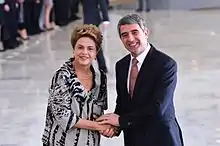
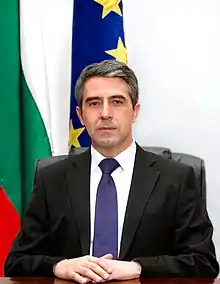
Plevneliev became Minister of Regional Development and Public Works under Deputy Prime Minister Simeon Djankov on 27 July 2009. Minister Plevneliev was one of a handful of "reformers" in the government, together with Deputy Prime Minister Simeon Djankov, the Minister of Economy Traicho Traikov and the Minister of Environment Nona Karadzhova.
He was announced as GERB's candidate for President of Bulgaria on 4 September 2011.[11] He subsequently won the presidential election in a second round held on 30 October 2011, with a majority of 52.58% of the vote.[12] He defeated Ivaylo Kalfin from the Bulgarian Socialist Party in the second round. He took the presidential oath on 19 January 2012 and officially took over from his predecessor Georgi Parvanov on 22 January 2012. Among his priorities are administrative reforms, energy efficiency and energy independence and removing of ambassadors of Bulgaria in foreign countries who have served as secret agents during the Communist regime.
As a result of the 2013 Bulgarian protests against monopoly and high electricity prices, the conservative government of Prime Minister Boyko Borisov tendered its resignation on 20 February 2013. President Plevneliev, acting in accordance with the constitution, offered a mandate to form a new government within the term of the current Parliament to GERB, BSP and DPS but after each of them declined, Plevneliev appointed a caretaker government on 13 March 2013, with Marin Raykov, the Bulgarian ambassador in Paris as Prime Minister and Minister of Foreign Affairs.[13]
In 2013, due to the prolonged protests against the involvement of oligarchy in politics and the government, Plevneliev organised the 'Dialogue with citizens' initiative, which involved three debates, focused on market economy, the judicial system and media freedom.[14]
Plevneliev advocates for closer relations between Bulgaria and the People's Republic of China.[15][16]
Plevneliev has frequently criticized the immigration policy in the UK set by the former Prime Minister, David Cameron.[17]
By appointing the Bliznashki Government on 6 August 2014, Plevneliev has become the first President of Bulgaria to appoint more than one caretaker government.
In October 2022, Rosen Plevneliev was invited by GERB to become head of a contact group for cabinet talks, formed by the party.[18] He accepted the invitation. The contact group held meetings with all the pro-European and democratic forces within the 48th National Assembly. However the negotiations ended with no agreement reached.
A year later, in September 2023, Plevneliev along with the ex-Minister of Foreign Affairs and President of the Atlantic Club of Bulgaria Solomon Passy and a number of other opinion leaders and public figures issued a public statement, proposing that Bulgaria's EU and NATO membership be included in the Constitution of Bulgaria.
Controversies
In January 2014 the tax authorities launched an investigation on President Rosen Plevneliev and his relatives. This action was perceived as politically motivated assault by the Oresharski Government.[19] Other reformist members of the Boyko Borisov government were also subject to such investigations.
Honours
Foreign honours
 Greece: Grand Collar of the Order of the Redeemer (4 July 2012)[20]
Greece: Grand Collar of the Order of the Redeemer (4 July 2012)[20] Poland: Order of the White Eagle (14 November 2014)[21]
Poland: Order of the White Eagle (14 November 2014)[21] Portugal: Grand Collar of the Order of Prince Henry (15 June 2015)[22]
Portugal: Grand Collar of the Order of Prince Henry (15 June 2015)[22] Slovakia: Grand Cross of the Order of the White Double Cross (10 December 2015)[23]
Slovakia: Grand Cross of the Order of the White Double Cross (10 December 2015)[23] Brazil: Grand Collar of the Order of the Southern Cross (1 February 2016)[24]
Brazil: Grand Collar of the Order of the Southern Cross (1 February 2016)[24]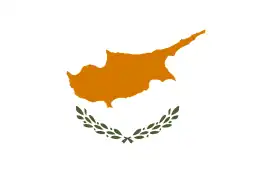 Cyprus: Grand Collar of the Order of Makarios III (22 February 2016)[25]
Cyprus: Grand Collar of the Order of Makarios III (22 February 2016)[25] Austria: Grand Star of the Decoration of Honour for Services to the Republic of Austria (26 April 2016)[26]
Austria: Grand Star of the Decoration of Honour for Services to the Republic of Austria (26 April 2016)[26] Albania: Honor of the Nation Decoration (1 June 2016)[27]
Albania: Honor of the Nation Decoration (1 June 2016)[27] Germany: Grand Cross Special Class of the Order of Merit of the Federal Republic of Germany (22 June 2016)[28]
Germany: Grand Cross Special Class of the Order of Merit of the Federal Republic of Germany (22 June 2016)[28] Ukraine: First Class of the Order of Prince Yaroslav the Wise (29 June 2016)[29]
Ukraine: First Class of the Order of Prince Yaroslav the Wise (29 June 2016)[29] Slovenia: Order for Exceptional Merits (25 July 2016)[30]
Slovenia: Order for Exceptional Merits (25 July 2016)[30] Italy: Knight Grand Cross with Collar of the Order of Merit of the Italian Republic (4 August 2016)[31]
Italy: Knight Grand Cross with Collar of the Order of Merit of the Italian Republic (4 August 2016)[31] Croatia: Grand Order of King Tomislav (25 August 2016)[32]
Croatia: Grand Order of King Tomislav (25 August 2016)[32]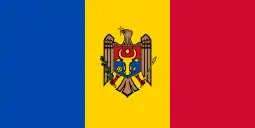 Moldova: Order of the Republic (5 October 2016)[33]
Moldova: Order of the Republic (5 October 2016)[33] Hungary: Grand Cross with Chain of the Hungarian Order of Merit (10 November 2016)[34]
Hungary: Grand Cross with Chain of the Hungarian Order of Merit (10 November 2016)[34] Romania: Collar of the Order of the Star of Romania (2016)
Romania: Collar of the Order of the Star of Romania (2016)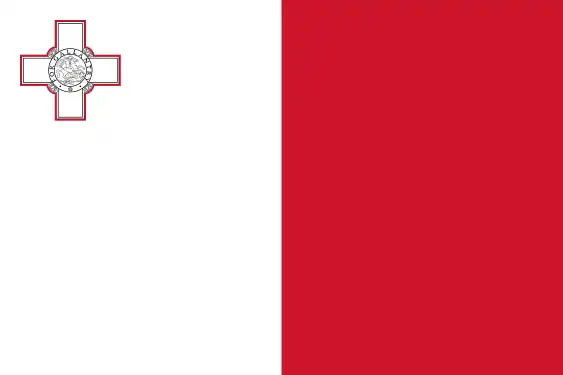 Malta: Companion of Honour of the National Order of Merit (17 November 2016)[35]
Malta: Companion of Honour of the National Order of Merit (17 November 2016)[35]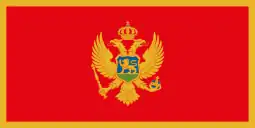 Montenegro: Grand Cross of the Order of the Republic of Montenegro (20 December 2016)[36]
Montenegro: Grand Cross of the Order of the Republic of Montenegro (20 December 2016)[36]- House of Habsburg-Lorraine: Order of St. George[37]
 France: Commander of the Legion of Honour (15 November 2018)[38]
France: Commander of the Legion of Honour (15 November 2018)[38]
References
- "Biography of Rosen Plevneliev (Bulgarian)". Novinite. Sofia News Agency. Archived from the original on 12 June 2014. Retrieved 2 December 2011.
- "Plevneliev Sworn in as President of Bulgaria". novinite.com. 19 January 2012. Retrieved 14 September 2019.
- Anton Todorov (11 November 2012). "Rosen Plevnelien in the Upper Class of the Kingdom of Communism" (in Bulgarian). Retrieved 14 September 2019.
- Lilov 2013, p. 189.
- "Росен Плевналиев в "Нека говорят"с Росен Петров, bTV, 6.11.2011 г." (in Bulgarian). bTV. Archived from the original on 9 October 2012. Retrieved 30 August 2012.
- Lilov 2013, p. 190.
- Todorov, Anton (15 September 2014). "Чугунените комунисти Плевнелиев и Близнашки през 1987 г." [The Ironhead Communists Bliznashki and Plevneliev in 1987] (in Bulgarian). Frognews Agency. Retrieved 14 September 2019.
- Rosen Plevneliev
- "Росен Плевнелиев - от хороскопите до големите звезди на политиката". 24 Chasa newspaper. 30 October 2011. Retrieved 14 September 2019.
- "Presidential Biography". President of Bulgaria. Retrieved 14 September 2019.
- "Bulgaria's GERB puts up popular minister for president". trust.org. Reuters. 4 September 2011. Retrieved 14 September 2019.
- Plevneliev is Bulgaria's New President, novinite.com, 30. October 2011.
- "Президентът назначи служебното правителство и насрочи изборите" (in Bulgarian). dir.bg. 13 March 2013. Retrieved 14 September 2019.
- Lyubenova, Maria (2013). "Предизвикателствата пред новите ПР и медийни комуникации в перспективата на европейските реалности" (PDF) (in Bulgarian). Vol. 3, no. 3. Проблеми на постмодерността/Postmodernism problems. p. 272.
- "Bulgarian President-elect courts China". Novinite. 23 November 2011. Retrieved 14 September 2019.
- "China, Bulgaria pledge to deepen cooperation". Xinhua News Agency. 12 September 2012. Archived from the original on 8 December 2013. Retrieved 8 October 2012.
- Daniel Boffey (21 December 2013). "Politicians are judged by what they do and not by what they say". The Observer/The Guardian. Retrieved 14 September 2019.
- https://bnr.bg/en/post/101715640/gerb-to-form-a-contact-group-for-cabinet-talks
- Nikola Lalov (17 January 2014). "Президентът се усъмни в НАП, но поиска пълна данъчна проверка" [The President Doubts the Impartiality of Tax Inspections] (in Bulgarian). Retrieved 14 September 2019.
- "Плевнелиев получава най-висшия държавен орден на Гърция". www.novinite.bg (in Bulgarian). 4 July 2012.
- https://www.president.bg/news2301/
- https://www.president.bg/news2673/prezidentat-rosen-plevneliev-beshe-udostoen-s-portugalskiya-orden-ordem-do-infante-d-henrique.html
- https://www.prezident.sk/page/vyznamenania/
- Ministério das Relações Exteriores - Decreto de 1º de Fevereiro de 2016. Published by Imprensa Nacional in Section 1 of Diário Oficial da União of 2 February 2016. p.2. ISSN 1677-7042.
- https://www.president.bg/news3061/rosen-plevneliev-republika-kipar-mozhe-da-doprinese-za-energiynata-diversifikatsiya-v-yugoiztochna-evropa.html
- https://www.standartnews.com/balgariya-politika/plevneliev_nagraden_s_nayvisshiya_orden_na_avstriya-331059.html
- "Росен Плевнелиев: Държавите от Югоизточна Европа трябва да обединят усилията си в отстояването на европейските ценности" [Rosen Plevneliev: Southeastern European countries must join forces to uphold European values] (in Bulgarian). 1 June 2016. Retrieved 14 September 2019.
- "Плевнелиев и германският му колега Йоахим Гаук ще си разменят държавни ордени за края на мандата". Dnevnik (in Bulgarian). 22 June 2016. Retrieved 14 September 2019.
- https://www.president.gov.ua/documents/2792016-20239
- https://posta.up-rs.si/WEB_UP-RS/uprs-slo.nsf/objave/28862506980513C4C1258089003E1001?OpenDocument
- "Президентът Росен Плевнелиев беше удостоен с най-високото държавно отличие на Италианската република" [President Rosen Plevneliev is honored with the highest state honor of the Italian Republic] (in Bulgarian). 13 September 2016. Retrieved 14 September 2019.
- http://rus.bg/obschestvo/obschestvo/16683-prezident-bolgarii-nagrazhden-vysshej-nagradoj-khorvatii
- http://lex.justice.md/index.php?action=view&view=doc&lang=1&id=367040
- https://dailynewshungary.com/orban-presents-bulgarian-president-high-state-award/
- "Държавният глава Росен Плевнелиев е носител на ордена "Почетен кавалер на Националния орден за заслуги" на Република Малта" [Head of State Rosen Plevneliev is the recipient of the Companion of Honour of the National Order of Merit of the Republic of Malta] (in Bulgarian). 17 November 2016. Retrieved 14 September 2019.
- https://bta.bg/en/news//136282-President-Plevneliev-Receives-Montenegro-s-Highest-State-Honour
- https://www.georgsorden.at/en/honorary-knights/
- https://webcafe.bg/politika/810805487-udostoiha-rosen-plevneliev-s-frenskiya-orden-na-pochetniya-legion.html
Bibliography
- Lilov, Grigor (2013). Най-богатите българи [The Richest Bulgarians] (1st ed.). Sofia: "Кайлас" ЕООД. ISBN 978-954-92098-9-1.
